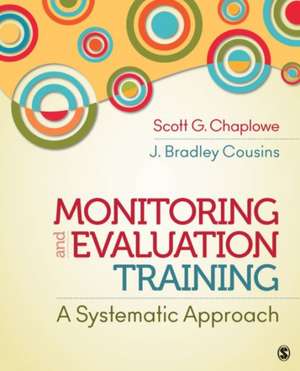Monitoring and Evaluation Training: A Systematic Approach
Autor Scott G. (Graham) Chaplowe, J. Bradley Cousinsen Limba Engleză Paperback – 28 dec 2015
Preț: 520.76 lei
Preț vechi: 703.73 lei
-26% Nou
Puncte Express: 781
Preț estimativ în valută:
99.65€ • 104.39$ • 82.59£
99.65€ • 104.39$ • 82.59£
Carte disponibilă
Livrare economică 18 martie-01 aprilie
Livrare express 04-08 martie pentru 39.69 lei
Preluare comenzi: 021 569.72.76
Specificații
ISBN-13: 9781452288918
ISBN-10: 1452288917
Pagini: 464
Dimensiuni: 187 x 232 x 27 mm
Greutate: 0.79 kg
Ediția:First Edition
Editura: SAGE Publications
Colecția Sage Publications, Inc
Locul publicării:Thousand Oaks, United States
ISBN-10: 1452288917
Pagini: 464
Dimensiuni: 187 x 232 x 27 mm
Greutate: 0.79 kg
Ediția:First Edition
Editura: SAGE Publications
Colecția Sage Publications, Inc
Locul publicării:Thousand Oaks, United States
Recenzii
This text is excellent for building the capacity of trainers that help professionals and nonprofessionals to learn about program evaluation.
The book contains useful guidelines for designing effective M&E training, or for designing training generally.
Monitoring and Evaluation Training: A Systematic Approach reflects a meticulous review of the literature and discourse on evaluation capacity building and development to inform successful M&E training. It acknowledges the complexity of interdependent considerations, including larger organizational and societal contexts, to not only deliver effective M&E training, but also training transfer - the ability of trainees to apply M&E learning after training has been completed.
I often note that it seems like we’re endlessly training NGO staff in M&E, and frustrated with the mediocre work that results. Effective training is so much more than just delivering or facilitating good content. What is so essential about this book is that it fills a key gap on how to effectively train for M&E, and it does so in a thorough yet digestible format. In an era of increasing demand and need for evaluation capacity building, this book is a key tool for higher quality and more sustainable results.
Monitoring and Evaluation Training is a very comprehensive and well-illustrated training manual which is grounded on modern theories and presents practical application of all known M&E training and facilitation tools and methods. As a former trainer in Project Cycle Management related M&E and facilitator of planning and self-evaluation workshops, I would have loved to have such a book.
Whether managing or delivering M&E training in the fields of development or philanthropy, this book prides both the “nuts and bolts” as well as the conceptual backdrop for effective M&E training.
Written for a diversity of training contexts, this excellent and timely book draws extensively from current literature yet is highly practical, reflecting the vast real-world experience of the authors. It will be very useful for anyone who has to cultivate an appreciation for M&E and evaluative thinking in their organizations, teams or communities – whether evaluators, program managers, team leaders or researchers.
After more than 25 years of observing and delivering M & E training, I'm delighted to see this book which provides such good advice about building in adult learning principles and proper planning. M & E training is an important element of building and strengthening evaluation capacity. The book combines accessible guidance about principles of good instructional design and delivery with very practical exercises and examples. Novice and experienced M & E trainers could all learn from it.
Monitoring and Evaluation Training: A Systematic Approach is a welcome addition to the field of monitoring and evaluation, notable in its scope and breadth of a topic of increasingly importance in the evaluation community.
The authors support effectively capacity building in M&E by providing an enriching compendium of well-tried tools and practical hints for systematic training, complemented with a sound grasp of the underpinning theoretical concepts.
This book is valuable resource for people, like me, who are involved in building and strengthening evaluation capacity in the humanitarian sector. It balances the personal experience of the authors with up-to-date academic knowledge, communicated in an easy and humorous way that makes reading this book serious fun.
The book contains useful guidelines for designing effective M&E training, or for designing training generally.
Monitoring and Evaluation Training: A Systematic Approach reflects a meticulous review of the literature and discourse on evaluation capacity building and development to inform successful M&E training. It acknowledges the complexity of interdependent considerations, including larger organizational and societal contexts, to not only deliver effective M&E training, but also training transfer - the ability of trainees to apply M&E learning after training has been completed.
I often note that it seems like we’re endlessly training NGO staff in M&E, and frustrated with the mediocre work that results. Effective training is so much more than just delivering or facilitating good content. What is so essential about this book is that it fills a key gap on how to effectively train for M&E, and it does so in a thorough yet digestible format. In an era of increasing demand and need for evaluation capacity building, this book is a key tool for higher quality and more sustainable results.
Monitoring and Evaluation Training is a very comprehensive and well-illustrated training manual which is grounded on modern theories and presents practical application of all known M&E training and facilitation tools and methods. As a former trainer in Project Cycle Management related M&E and facilitator of planning and self-evaluation workshops, I would have loved to have such a book.
Whether managing or delivering M&E training in the fields of development or philanthropy, this book prides both the “nuts and bolts” as well as the conceptual backdrop for effective M&E training.
Written for a diversity of training contexts, this excellent and timely book draws extensively from current literature yet is highly practical, reflecting the vast real-world experience of the authors. It will be very useful for anyone who has to cultivate an appreciation for M&E and evaluative thinking in their organizations, teams or communities – whether evaluators, program managers, team leaders or researchers.
After more than 25 years of observing and delivering M & E training, I'm delighted to see this book which provides such good advice about building in adult learning principles and proper planning. M & E training is an important element of building and strengthening evaluation capacity. The book combines accessible guidance about principles of good instructional design and delivery with very practical exercises and examples. Novice and experienced M & E trainers could all learn from it.
Monitoring and Evaluation Training: A Systematic Approach is a welcome addition to the field of monitoring and evaluation, notable in its scope and breadth of a topic of increasingly importance in the evaluation community.
The authors support effectively capacity building in M&E by providing an enriching compendium of well-tried tools and practical hints for systematic training, complemented with a sound grasp of the underpinning theoretical concepts.
This book is valuable resource for people, like me, who are involved in building and strengthening evaluation capacity in the humanitarian sector. It balances the personal experience of the authors with up-to-date academic knowledge, communicated in an easy and humorous way that makes reading this book serious fun.
Cuprins
Part I: Key Concepts of M&E Training
1. M&E Training That Makes a Difference
What is M&E Training That Makes a Difference?
Systems Thinking for Training
Revisiting M&E
The Rising Demand for M&E Training
Who Provides M&E Training?
What Kind of M&E Training?
Chapter Summary
Recommended Resources
2. The Training Landscape
What is a Training?
Formal, Non-formal, Informal, and Incidental Education
Training Types – A Brief Overview
Face-to-Face Training
Distance Training and eLearning
Blended Learning
Chapter Summary
Appendices
Recommended Resources
3. The M&E Capacity Building Context
What is Evaluation Capacity Building?
M&E Capacity Building at the Individual Level
M&E Capacity Building at the Organizational Level
M&E Capacity Building in the External Environment
M&E Capacity Assessment and Strategic Planning
Chapter Summary
Recommended Resources
4. Adult Learning
What is Learning?
How Adults Learn
Andragogy
Experimental Learning
Learning Styles and Preferences
Differentiated Instruction
Learner-Centered Training
Adult-Learning Principles for Effective M&E Training
Chapter Summary
Recommended Resources
5. What Makes a Good M&E Trainer?
Trainer Competencies
Recruiting a Trainer
Chapter Summary
Appendices
Recommended Resources
Part II: A Systematic Approach to M&E Training
6. An Overview of the ADDIE Framework for Training
ADDIE as a Systematic and Systems Approach for Training
Why Have We Chosen the ADDIE for This Book?
Planning to Manage the ADDIE Process
Chapter Summary
Appendices
Recommended Resources
7. Training Analysis
Solution Analysis
Needs and Outcomes Analysis
Trainee Analysis
Context Analysis
Task Analysis
Gap and Causal Analysis
Training Analysis Report
Chapter Summary
Recommended Resources
8. Training Design
Identify Training Objectives
Preparing Learning Objectives
Organizing the Instructional Content
Designing the Training Curriculum
Designing Training Evalaution and Follow-Up
Chapter Summary
Recommended Resources
9. Training Development and Preparation
Develop Training Materials and Resources
Review and Pilot the Training
Preparing for an M&E Training Workshop
Chapter Summary
Recommended Resources
10. Training Implementation
Training Facilitation
Facilitating the Workshop Introduction, Activities, and Closing
Chapter Summary
Recommended Resources
11. Training Evaluation
What is Training Evaluation?
Training Evaluation Methods - An Overview
Training Evaluation Guidelines
Determining Who Will Conduct Training Evaluation
Chapter Summary
Appendices
Recommended Resources
Part III: M&E Training Methods and Techniques
Icebreakers
Energizers
Lectures
Discussion Activities
Subgroup Formations
Case Studies
Learning Games
Guest Speakers
Panel Discussions and Debates
Role Playing
Simulations
Demonstrations
M&E Software Activities
Learner Presentations
Practicum Experiences
Independent Learning Activities
Review Activities
Learning Assessment Activities
Training Monitoring and Evaluation Activities
Training Closing Activities
Training Follow-Up Activities
1. M&E Training That Makes a Difference
What is M&E Training That Makes a Difference?
Systems Thinking for Training
Revisiting M&E
The Rising Demand for M&E Training
Who Provides M&E Training?
What Kind of M&E Training?
Chapter Summary
Recommended Resources
2. The Training Landscape
What is a Training?
Formal, Non-formal, Informal, and Incidental Education
Training Types – A Brief Overview
Face-to-Face Training
Distance Training and eLearning
Blended Learning
Chapter Summary
Appendices
Recommended Resources
3. The M&E Capacity Building Context
What is Evaluation Capacity Building?
M&E Capacity Building at the Individual Level
M&E Capacity Building at the Organizational Level
M&E Capacity Building in the External Environment
M&E Capacity Assessment and Strategic Planning
Chapter Summary
Recommended Resources
4. Adult Learning
What is Learning?
How Adults Learn
Andragogy
Experimental Learning
Learning Styles and Preferences
Differentiated Instruction
Learner-Centered Training
Adult-Learning Principles for Effective M&E Training
Chapter Summary
Recommended Resources
5. What Makes a Good M&E Trainer?
Trainer Competencies
Recruiting a Trainer
Chapter Summary
Appendices
Recommended Resources
Part II: A Systematic Approach to M&E Training
6. An Overview of the ADDIE Framework for Training
ADDIE as a Systematic and Systems Approach for Training
Why Have We Chosen the ADDIE for This Book?
Planning to Manage the ADDIE Process
Chapter Summary
Appendices
Recommended Resources
7. Training Analysis
Solution Analysis
Needs and Outcomes Analysis
Trainee Analysis
Context Analysis
Task Analysis
Gap and Causal Analysis
Training Analysis Report
Chapter Summary
Recommended Resources
8. Training Design
Identify Training Objectives
Preparing Learning Objectives
Organizing the Instructional Content
Designing the Training Curriculum
Designing Training Evalaution and Follow-Up
Chapter Summary
Recommended Resources
9. Training Development and Preparation
Develop Training Materials and Resources
Review and Pilot the Training
Preparing for an M&E Training Workshop
Chapter Summary
Recommended Resources
10. Training Implementation
Training Facilitation
Facilitating the Workshop Introduction, Activities, and Closing
Chapter Summary
Recommended Resources
11. Training Evaluation
What is Training Evaluation?
Training Evaluation Methods - An Overview
Training Evaluation Guidelines
Determining Who Will Conduct Training Evaluation
Chapter Summary
Appendices
Recommended Resources
Part III: M&E Training Methods and Techniques
Icebreakers
Energizers
Lectures
Discussion Activities
Subgroup Formations
Case Studies
Learning Games
Guest Speakers
Panel Discussions and Debates
Role Playing
Simulations
Demonstrations
M&E Software Activities
Learner Presentations
Practicum Experiences
Independent Learning Activities
Review Activities
Learning Assessment Activities
Training Monitoring and Evaluation Activities
Training Closing Activities
Training Follow-Up Activities
Notă biografică
Descriere
Offering a systematic approach, this book bridges theoretical concepts with practical, how-to knowledge to support monitoring and evaluation training that makes a difference.










